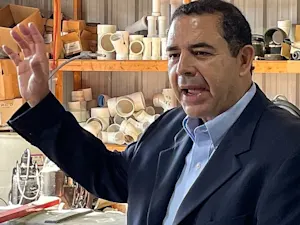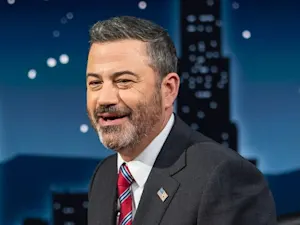
'60 Minutes' Tribute Turns Into Televised Takedown
Wordmark for the CBS Television newsmagazine '60 Minutes'. Photo courtesy of ViacomCBS. Public domain.
It was supposed to be a respectful farewell. Instead, it became a seismic moment in broadcast journalism. On the April 27 broadcast of "60 Minutes," veteran anchor Scott Pelley closed the program with a heartfelt tribute to departing executive producer Bill Owens — then pivoted sharply, using the moment to call out the show's corporate overlords in a live, nationally televised takedown that's still echoing across media and political circles.
The public rarely gets a front-row seat to internal network power struggles. But that's exactly what viewers got Sunday night — and the implications stretch far beyond one producer's resignation.
What Is '60 Minutes,' and Why Does This Matter?
Since its debut in 1968, "60 Minutes" has been a cornerstone of American investigative journalism. With its iconic stopwatch ticking ominously, the program has tackled war zones, presidential scandals, and whistleblower exposés. It has won Emmy® after Emmy, built careers, and — until now — largely stayed out of the drama it reports on.
For decades, it projected an image of independence and integrity. That image cracked live on air when one of its most prominent correspondents suggested those days might be over.
Owens Quits, Pelley Speaks, and Viewers Watch in Shock
Bill Owens, the show's third executive producer in 57 years, resigned last week, citing loss of editorial independence. According to a memo obtained by Fox News, Owens wrote, "Over the past months, it has also become clear that I would not be allowed to run the show as I have always run it. To make independent decisions based on what was right for 60 Minutes, right for the audience."
"So, having defended this show – and what we stand for – from every angle, over time with everything I could, I am stepping aside so the show can move forward."
Host Scott Pelley did not mince words in his televised tribute. According to Fox News, Pelley said, "Bill was with CBS News nearly 40 years, 26 years at '60 Minutes.' He covered the world, covered combat, the White House. His was a quest to open minds, not close them. If you've ever worked hard for a boss because you admired them, then you understand what we've enjoyed here."
Pelley also said Owens resigned "for us and you" and credited Owens with upholding "honest journalism," according to Fox.
Editorial Independence or Corporate Control?
Pelley's closing comments also carried an ominous warning: the long-standing independence of "60 Minutes" may be slipping. While he stressed that no stories were directly censored, he said oversight had changed — and not in a way that journalists were comfortable with.
Owens reportedly left under pressure. The New York Post reported that Shari Redstone, Paramount's (CBS' parent company) controlling shareholder, wanted Owens out. Some insiders believe his removal could smooth the path to merger approval. Paramount has not publicly responded to these claims.
The new interim producer is Tanya Simon, daughter of late "60 Minutes" legend Bob Simon. Her role moving forward may help stabilize internal morale — or become a lightning rod, depending on how much latitude she's given by the network's higher-ups.
Corporate Tensions and Political Entanglements
Owens' resignation comes as Paramount Global pursues an $8.4 billion merger with Skydance Media — a deal that needs federal approval. That approval must come from a government currently headed by President Donald Trump.
Coincidentally — or not — Trump is suing CBS and Paramount for $20 billion. He alleges the network deceptively edited a "60 Minutes" interview with then-Vice President Kamala Harris before the 2024 election, calling it "unlawful and illegal behavior," according to the New York Post.
The case is in mediation, and FCC Chair Brendan Carr confirmed Monday that "all options remain on the table" in his agency's ongoing investigation into the broadcast, including possibly losing its broadcasting license, according to Reuters.
CBS's attempt to dismiss the case was rejected. While no final ruling has been made, the investigation itself creates pressure. According to Reuters, CBS insists the complaint is meritless and warns that ruling against them could effectively turn the FCC into a "full-time censor of content."
That puts "60 Minutes" in the crosshairs of both its corporate boardroom and the federal government.
What Happens Now?
The fallout isn't over. "60 Minutes" now faces a new era with a new producer, a federal investigation, a high-stakes lawsuit, and a merger that could reshape its future — or threaten its identity altogether.
Owens' dramatic exit and Pelley's striking on-air stand may become a defining moment not just for the show, but for broadcast journalism more broadly. Will "60 Minutes" remain a beacon of integrity, or become another casualty in the collision between politics, money, and media?
Viewers will be watching. Closely.
References:'60 Minutes' Says Outgoing Producer Felt He Lost Independence After Paramount Began Supervising Stories | '60 Minutes' Host Scott Pelley Calls Out Paramount in Shocking On-Air Attack on CBS’ Parent Company | FCC Chair Says 'All Options' Open in CBS '60 Minutes' News Distortion Review | Host of CBS’s 60 Minutes Rebukes Corporate Owners Paramount On-Air























